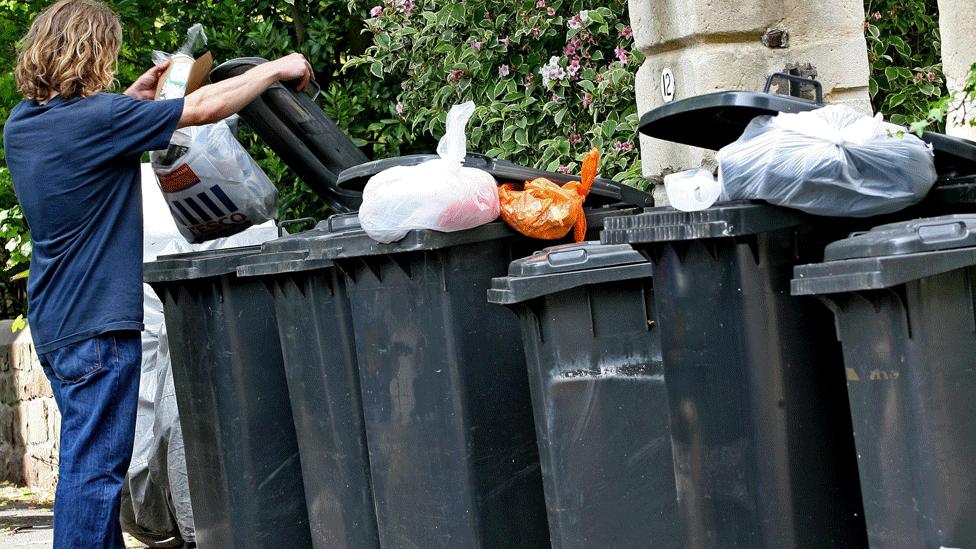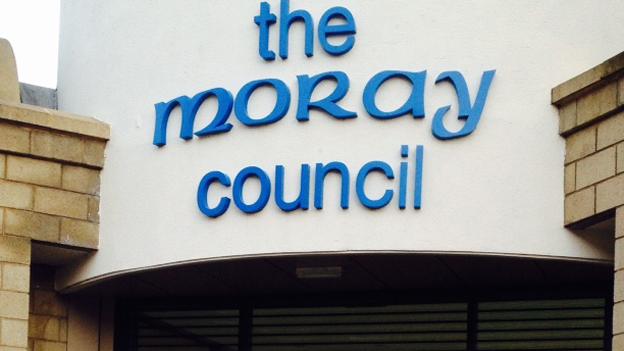Cosla urges councils to reject Scottish government funding deal
- Published

Cosla leaders said the budget cuts inherent in the funding deal would hit local services
The group representing many of Scotland's councils has urged them to reject the Scottish government's funding settlement offer.
Council leaders on the Convention of Scottish Local Authorities voted by 21 to 7 to reject the "unacceptable" deal.
The motion said the Scottish government's approach was "wholly misguided" and "threatens grievous injury" to communities and citizens.
Finance secretary John Swinney called the offer "a deal worth taking".
Councils have until 9 February to respond to the settlement offer.
All councils in the Cosla grouping which are not run by the SNP united against the deal, with some looking at the possibility of a legal challenge.
Scotland's four other councils which are not part of Cosla also met, and are exploring whether the terms of the deal being offered are legal.
'Horrendous sanctions'
The funding package on offer prioritises maintaining the council tax freeze, which has been in place since 2007, with any councils which break it facing a loss of Scottish government funding.
However, some councils are considering raising taxes anyway in the face of budget pressures.
Talks have been taking place between Mr Swinney and council leaders, with the deadline for the deal to be accepted repeatedly pushed back.
Following a meeting of Cosla in Edinburgh, president David O'Neill announced the grouping had rejected the funding package as "totally unacceptable and an attack on our democratic mandate".
He said: "The Scottish government is basically forcing individual councils into having to accept the deal.
"Sadly, I fully accept that individual councils, due to the horrendous sanctions they would face, will find that they have no other option but to give in to central direction on this occasion.
"In imposing the deal on individual councils, the most vulnerable in our communities will be left to pick up the pieces."

Cosla wants local authorities to bin the Scottish government's funding deal

Analysis by Jamie McIvor, BBC Scotland local government correspondent
Today's vote at Cosla is largely symbolic but demonstrates just how angry some councils are over the budget offer.
21 of 28 councils backed a motion condemning the funding offer. Only SNP councils voted against.
The move makes it hard for local government to present a united front.
Some councils are genuinely angry - even allowing for the politically-charged atmosphere as the Holyrood election approaches.
First they feared they would have to make bigger cuts and savings than they anticipated.
Then their concern deepened when it emerged the deal on offer made it even harder than before to contemplate raising council tax to help compensate.
One council, Moray, had proposed an 18% rise in its council tax rates but the calculations which led to this figure are now redundant.
Meanwhile SNP councils, while not disputing that the funding offer is a challenge, believe the offer is, on balance, the best they can expect.
The government made a manifesto commitment to freeze the council tax for the whole of this parliamentary term - it believes this has been a popular policy which has been a help to family budgets.
It also argues it has protected councils from the worst of what it calls Westminster spending cuts.
The move by the four councils which are not in Cosla - which include Glasgow and Aberdeen - to explore whether the offer is legal rests on a very specific point.
But the fact they are looking at this option demonstrates the depth of their concern. And, indeed, shows how many trump cards the Scottish government holds.
Realistically councils have little choice but to accept the government's funding offer.
This begs longer term questions about the whole system of council funding.
A recent report - commissioned jointly by the government and Cosla - set out several possible alternatives to the council tax in detail.
There is also a debate over whether councils should be less dependent on the government and have more ways of raising cash locally.
The parties are all likely to set out their proposals ahead of May's Holyrood election.

The motion accepted by Cosla said the deal would see council budgets slashed by £350m, and would be "undeliverable without an unacceptable level of cuts to services and staffing".
Trade union GMB Scotland has claimed 8,785 local authority jobs are under threat due to budget cuts, and is planning a rally outside the Scottish Parliament next week.
'Held to ransom'
Jenny Laing, leader of Aberdeen City Council, which is not part of Cosla, said the relationship between the Scottish government and councils was "broken".
Speaking after the Scottish Local Government Partnership (SLGP) met in Glasgow, she said: "This is the most significant grant cut ever applied to local government.
"And when we've carried out our civic duty to question the settlement on behalf of our residents, we've been held to ransom by the Scottish government's attempt to control decisions which should be made by democratically-elected representatives."
She said the group was "seeking legal advice" on the matter.
Scottish Labour and the Lib Dems said it was now time for Mr Swinney to "re-think" the deal on the table.
Responding to the Cosla and SLGP votes, John Swinney said: "This is a deal worth taking.
"Our funding proposals deliver a strong but challenging financial settlement for local government, despite cuts to the central budget by the UK government.
"It is a deal that will see an additional £250m invested in social care, it will help councils deliver the Living Wage giving 40,000 people a pay rise, it will freeze council tax for a ninth consecutive year, and it protects the pupil-teacher ratio, helping improve attainment.
"Overall, as a percentage of total revenue expenditure, the reduction in local authority budgets is around just 2 per cent.
"So while I recognise this will not be easy for councils to accommodate, some of the language used to describe the deal has been unnecessary. I hope and expect cooler heads will comes to realise this is a deal councils can and should accept."
- Published28 January 2016

- Published26 January 2016

- Published13 January 2016

- Published26 January 2016
